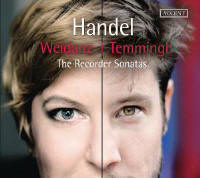Texte paru dans: / Appeared in: |
|
|
Appréciation d'ensemble / Overall evaluation :
|
|
|
Reviewer:
Michael Tanner
These six sonatas are not among Handel’s best-known works, perhaps because the very word ‘recorder’ has many people running for cover. I have been among them, but this disc came as a most agreeable surprise, providing constant pleasure for more than an hour. As Wiebke Weidanz says in the conversation between her and her partner, the upper part in almost all of the sonatas is very vocal, reminding us that Handel was foremost an operatic composer. One can even detect in many of the movements the emotion that, if they were being sung, the character would be expressing – the usual range is joy, anticipation, rage, outrage and despondency. Handel tends to express feeling rather than create character, so an instrument which is as versatile as the recorder, certainly when played by Stefan Temmingh, can do the job pretty well as convincingly as the human voice.These sonatas consist of a prelude or flourish on the harpsichord, except for the last, which is by Purcell and played on the flute, and the purpose of which was to make sure the instruments were at the same pitch, followed by between three and seven movements, mainly alternating fast and slow. ‘Sonata’ here has nothing to do with its meaning in the classical period; better to think of brief arias, usually extremely brief, but welcomely concentrated. Weidanz produces wonders of variety on her harpsichord, and the pair are clearly intimate enough to semi-improvise much of the time. | |
|
|
|
|
|
|
|
Cliquez l'un ou l'autre
bouton pour découvrir bien d'autres critiques de CD |
|



